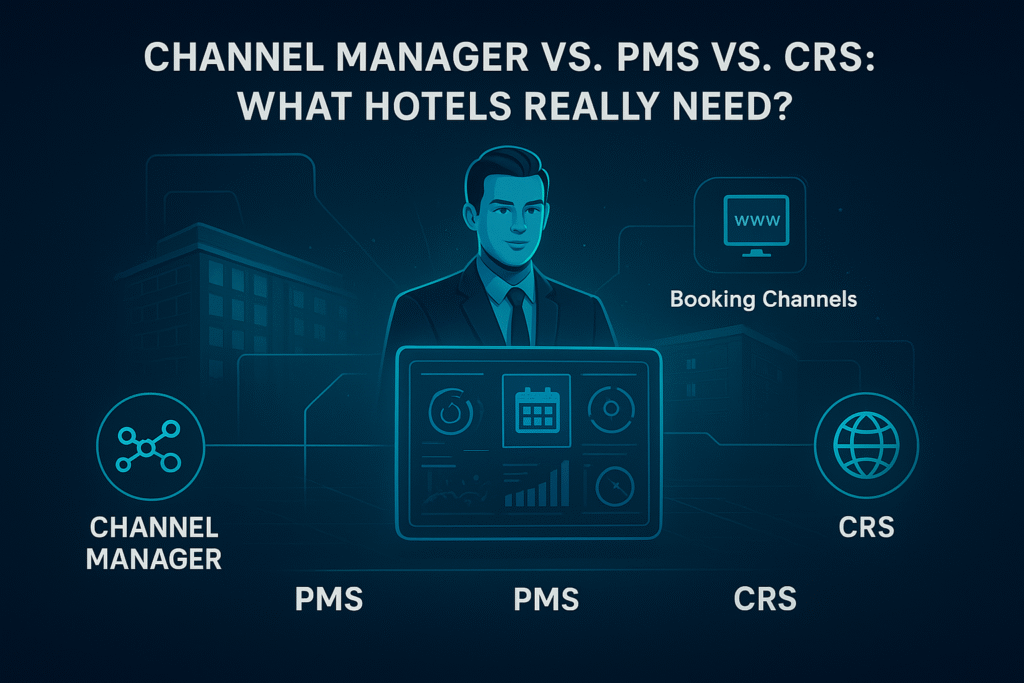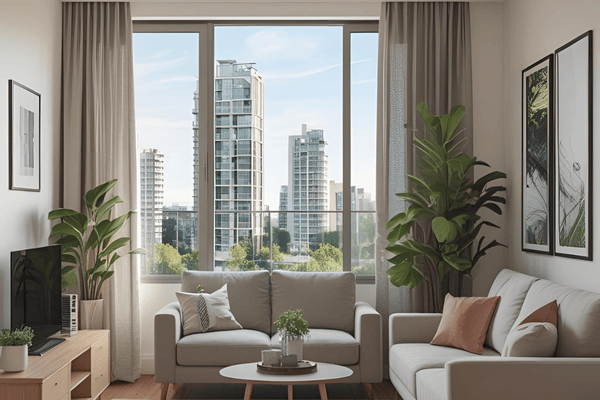In today’s tech-driven hospitality industry, hotels must adopt smart software solutions to stay competitive, streamline operations, and enhance guest experiences. Among the most critical tools available to hoteliers are the Channel Manager, Property Management System (PMS), and Central Reservation System (CRS).
While each tool serves a unique purpose, there’s often confusion about what each system does, how they differ, and whether a hotel needs all three. This guide breaks down the differences between a Channel Manager, PMS, and CRS—and helps you decide which combination is right for your hotel.

Understanding the Basics
What is a Channel Manager?
A Channel Manager is a tool that connects your hotel’s inventory and rates to multiple Online Travel Agencies (OTAs) and booking channels in real time. It ensures that every booking is updated instantly across all platforms to prevent overbooking and maintain rate parity.
Key Features:
- Real-time rate and availability updates
- Multi-channel inventory synchronization
- Booking updates to PMS or CRS
- Rate parity across OTAs
- Performance analytics by channel
What is a Property Management System (PMS)?
A PMS is the central system that manages a hotel’s front desk operations, including reservations, check-in/check-out, housekeeping, guest profiles, and billing.
Key Features:
- Reservation management
- Room assignment and availability
- Front desk and housekeeping coordination
- Guest billing and folio generation
- Reports and analytics
The PMS acts as the “brain” of hotel operations, handling both administrative and guest-facing functions.
What is a Central Reservation System (CRS)?
A Central Reservation System (CRS) is a platform used to manage and distribute a hotel’s inventory and rates across multiple booking channels, including direct website bookings, call centers, GDS (Global Distribution Systems), and more.
Key Features:
- Centralized reservation control
- Integration with direct and indirect booking channels
- Rate and inventory management
- Call center integration
- Group booking support
CRS is especially useful for hotel chains or properties with multiple outlets needing centralized control over bookings and rates.
Comparing Channel Manager, PMS, and CRS
| Feature | Channel Manager | PMS | CRS |
|---|---|---|---|
| Main Purpose | Manage online distribution | Manage hotel operations | Centralize reservations across channels |
| Booking Management | Limited (OTA-focused) | Yes (property level) | Yes (multi-channel) |
| Room & Rate Updates | Across OTAs | Within the property | Across channels and direct bookings |
| OTA Integration | Yes | Sometimes via Channel Manager | Yes |
| Guest Management | No | Yes | Limited |
| Best For | Independent hotels | All hotel sizes | Multi-property groups or chains |
Use Case Scenarios: Which One Do You Really Need?
✅ Scenario 1: Small Independent Hotel or Guesthouse
Recommendation:
- PMS + Channel Manager
Why:
You need a PMS to manage reservations and operations. A channel manager ensures your inventory and pricing are updated across OTAs. You don’t need a CRS unless you manage multiple properties.
✅ Scenario 2: Medium-Sized Hotel with Strong Online Sales
Recommendation:
- PMS + Channel Manager + Optional CRS
Why:
You need seamless coordination between front desk operations and online bookings. A CRS may be useful if you also take group bookings or manage direct website traffic in volume.
✅ Scenario 3: Hotel Chain or Group with Multiple Properties
Recommendation:
- CRS + PMS + Channel Manager
Why:
A CRS centralizes reservations across all properties. The PMS handles each hotel’s operations, and the channel manager connects to global booking platforms to manage third-party distribution.
Benefits of Using All Three Systems Together
When integrated correctly, the PMS, CRS, and Channel Manager form a powerful ecosystem that supports:
- Real-time availability updates
- Accurate pricing across channels
- Centralized booking control
- Improved guest experience through automation
- Operational efficiency and reduced manual errors
Common Misconceptions
❌ “A Channel Manager Replaces a PMS”
While a channel manager handles rate and inventory distribution, it does not manage guest check-ins, billing, or operations. It complements a PMS but doesn’t replace it.
❌ “A CRS is Only for Large Hotels”
Though commonly used in chains, CRS can be beneficial for growing independent hotels managing multiple booking platforms or locations.
❌ “Using Multiple Systems Creates More Work”
Modern systems are designed for integration. When connected properly, they reduce manual tasks and improve efficiency across all departments.
How Integration Works Between PMS, CRS, and Channel Manager
- PMS ↔ CRS:
Reservations from the CRS flow into the PMS, which updates room availability and guest profiles. - CRS ↔ Channel Manager:
The CRS sends updated inventory to the channel manager, which pushes it out to OTAs and other channels. - Channel Manager ↔ PMS:
Bookings made via OTAs are pushed from the channel manager into the PMS automatically.
This triangle of integration ensures data consistency, zero manual duplication, and real-time updates.
Key Features to Look for When Choosing These Systems
🔍 For PMS:
- Cloud-based access
- Integration capabilities (API or built-in)
- Housekeeping and front desk automation
- Multi-device compatibility
🔍 For Channel Manager:
- Real-time syncing
- Support for multiple OTAs
- Rate parity monitoring
- Reporting and analytics
🔍 For CRS:
- Scalable across multiple properties
- GDS and direct booking integration
- Group and corporate booking support
- Custom rate plans and promotions
Choosing the Right System for Your Hotel Size
| Hotel Type | Recommended Setup |
|---|---|
| Small B&B / Guesthouse | PMS + Channel Manager |
| Boutique Hotel | PMS + Channel Manager + Optional CRS |
| Resort | Full stack: PMS + CRS + Channel Manager |
| Multi-property chain | PMS (per property) + Centralized CRS + Unified Channel Manager |
ROI of a Properly Integrated Tech Stack
Investing in these systems may seem costly upfront, but the return on investment (ROI) is significant:
- 🔹 Increased bookings due to broader visibility
- 🔹 Reduced OTA commissions via better rate control
- 🔹 Improved guest satisfaction through efficient service
- 🔹 Fewer operational errors and manual tasks
- 🔹 Faster check-ins/check-outs, boosting reviews
Conclusion
In the battle of Channel Manager vs. PMS vs. CRS, there is no one-size-fits-all answer. Instead of choosing just one, consider how these systems work together to support your hotel’s unique goals.
- If you’re a small independent property, a PMS with a channel manager may be enough.
- For a growing hotel, adding a CRS helps consolidate your reservation strategy.
- For chains and groups, all three systems are essential to ensure centralized control, efficient operations, and maximized revenue.
The real question isn’t “Which one should I choose?” but rather, “How can I integrate these systems to work better together for my hotel?”

